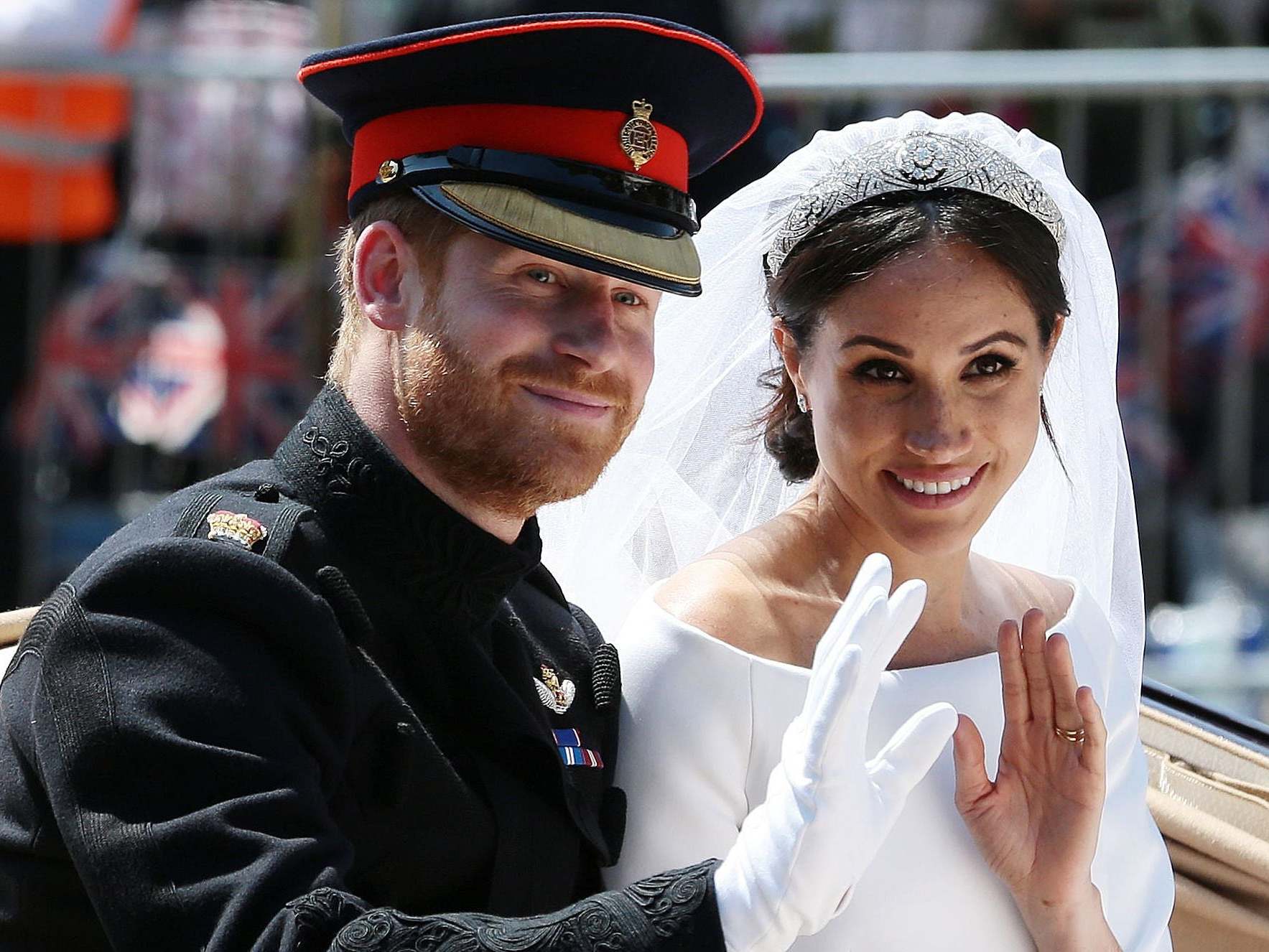How the couple who were supposed to ‘modernise the monarchy’ turned their backs on it
From the outside, it looked like a life of privilege and perfect romance. But the expectations placed on Harry and Meghan's shoulders were impossible to live up to, explain Sophie Gallagher and Harriet Hall


Your support helps us to tell the story
From reproductive rights to climate change to Big Tech, The Independent is on the ground when the story is developing. Whether it's investigating the financials of Elon Musk's pro-Trump PAC or producing our latest documentary, 'The A Word', which shines a light on the American women fighting for reproductive rights, we know how important it is to parse out the facts from the messaging.
At such a critical moment in US history, we need reporters on the ground. Your donation allows us to keep sending journalists to speak to both sides of the story.
The Independent is trusted by Americans across the entire political spectrum. And unlike many other quality news outlets, we choose not to lock Americans out of our reporting and analysis with paywalls. We believe quality journalism should be available to everyone, paid for by those who can afford it.
Your support makes all the difference.It was the relationship that was supposed to mark the modernisation of the monarchy; instead, it became a turbulent tale of celebrity obsession, social media and family turmoil. In January, Meghan Markle and Prince Harry announced that they would be stepping down as senior members of the royal family in a move that shocked the world – yet wasn’t entirely unexpected.
In a statement on their Instagram page, the couple wrote: “After many months of reflection and internal discussions, we have chosen to make a transition this year into starting to carve out a progressive role within this institution. We intend to step back as ‘senior’ members of the Royal Family and work to become financially independent, while continuing the full support Her Majesty the Queen.”
The plot thickened shortly thereafter, when Buckingham Palace issued a public warning to the Sussexes which read: “We understand their desire to take a different approach, but these are complicated issues that will take time to work through.’’ The Independent understands that the mood at the palace was one of “disappointment”, after reports said the Queen and Prince Charles were not told of the bombshell announcement in advance.
Indeed, the Duke and Duchess of Sussex have been subject to an excessive amount of scrutiny since the beginning of their messages, from well-meaning yet intrusive fans to the occasionally less well-meaning “source” intent on casting aspersions on their lifestyle. They have been criticised for everything from their choice to keep the names of their son Archie Harrison’s godparents secret, to flying in Elton John’s private jet; Meghan was even publicly “called out” at one point for eating an avocado. After the couple escaped to the other side of the world for a Christmas break with Meghan’s mother, picture agencies found the couple’s isolated retreat and published aerial photographs and the location in an incident which the royals were said to be particularly upset about.
Who could have known that a blind date set up by a mutual friend in July 2016 would lead to one of the most well-publicised relationships of all time? Three years after their first meeting, in a 2019 interview with ITV’s Tom Bradby, Meghan said her British friends had warned her the British tabloid press would “destroy her life” if she chose to pursue Harry in a particularly revealing moment of candour. It was clear by then that the world’s adoration and antagonism had become suffocating thanks to the influence of social media and 24/7 news coverage.
Perhaps it should have been a sign of what was to come when the couple was forced to go public with their relationship in 2016 via a statement which concerned harassment and abuse directed at the prince’s then-girlfriend. The statement, issued by Kensington Palace, said that a “line has been crossed”, referencing both racism and sexism, as well as online trolls. It ended poignantly: “This is not a game – it is her life and his.”
Although an undercurrent of bile continued to flow in the following months, the couple’s engagement in November 2017 and subsequent wedding in May 2018 provided optimism that the country may embrace a new way of doing things. The nation watched as American bishop Michael Curry quoted Martin Luther King, and the Queen and Prince Phillip listened to a London gospel choir sing “Stand By Me”, inside the walls of St George’s chapel. Photographs of the wedding party showed Meghan’s mother Doria Ragland taking centre-stage in the gilded rooms of Buckingham Palace.
But it wasn’t to be. In the weeks after the wedding, stories about Meghan’s estranged father Thomas Markle, which had been bubbling away for some weeks, boiled over. The public’s taste for a family drama kept the controversy going far longer than anyone could have anticipated; an international following of people who felt like they “knew” the couple through familiarity with Meghan onscreen in her former job as an actor and familiarity with Harry as son of the Princess of Hearts all felt they had something to add.
“I think social media is to blame,” says Claudia Joseph, an author and royal commentator. “If you read the comments about Meghan on Twitter you can see why she’d want to escape.” In May 2019, BBC radio host Danny Baker was sacked by the corporation after tweeting a picture of a couple holding the hands of a suited chimpanzee with the accompanying caption, “Royal baby leaves hospital”. The broadcaster apologised and insisted he had held no racist intent.
Even during positive coverage, coded language surrounding the couple rang through. They have frequently been described as “modern” in a way that many felt alluded to Meghan’s racial background. And the sexism that followed Kate Middleton, the Duchess of Cambridge, at the beginning of her relationship with Prince William came for Meghan just as hard. Middleton was widely referred to as a “commoner” and pictures of her in a translucent dress at a student charity fashion show were splashed on front pages during her early days dating the elder son of Prince Charles. Meghan, in turn, had her divorcee status upheld as proof that she “couldn’t commit”; her age meant that she often had her fertility openly questioned; and her American citizenship meant regular comparisons were drawn with the American Wallis Simpson, wife of Edward VIII and the reason for his abdication of the throne.
One BBC Two comedy, Meghan Markle’s Royal Sparkle, memorably depicted the actress as foul-mouthed and violent, at one point shouting: “Stay the f*** out of my trailer or I’ll cut you, Kate.” It addressed rumours that Meghan was “difficult” and “mean” because she had reportedly questioned some elements of royal protocol, and drew attention to the absurdity of claims that the former actor had made the Duchess of Cambridge cry. People – especially women – are not expected to question the royal way of doing things. Whispers about Meghan’s insubordination quickly grew into roars of disapproval from conservative voices.
It’s true that royal protocol was not followed by Meghan and Harry as stringently as it was by Kate and William. It was, however, still largely followed: Meghan did, for instance, duly quit her job and delete her social media after her engagement to the prince was announced. To be a royal, many have surmised, is to live in a gilded cage – and it seems Meghan realised that early on, and openly expressed dissatisfaction about it. The Queen, a figure beloved even by the most staunch republicans, has always spoken of “duty” and the importance of getting on with the job one has been given. William and Kate appeared like a couple who shared a similar mindset. Harry and Meghan, however – the prince who always courted controversy and his Hollywood partner – fit much less comfortably into that structure. Their statement today about aiming for “financial independence” challenged the entire system the royals have lived within for centuries. They say that they will continue to be members of the royal family, but if they live in a different country and they take salaries which don’t come directly from the British taxpayer, as they seem to imply will be the case, then it’s hard to imagine how they will do so.
One can hardly blame the couple for wanting that financial independence: the fact that taxpayers fund the lifestyles of the royals has always meant the public feels it has a right to criticise their choices. There was an outcry over the amount of taxpayer money being used to renovate Frogmore Cottage for Meghan and Harry early in their marriage, even though estimates place renovations of other royal properties for William and Kate at more than double the cost. Rumours of a spat between the brothers didn’t help, nor did claims that Kate and Meghan didn’t get on.
Some criticisms of the couple can be seen as valid: that they advocated environmentally friendly travel, for instance, before taking several private jet trips (one, which they took on Elton John’s private plane, was carbon offset by the singer, but the PR damage had been done). They also posted a new picture of their son on social media on the day Prince William was launching a new anti-climate change initiative. Adding insult to injury, Harry’s suggestion that he and Meghan had chosen not to have more than two children for the good of the environment was received by many as a thinly veiled dig at his brother.
In a bid to reconnect with the public during a 10-day tour of South Africa, Meghan and Harry decided to utilise the press to their advantage. Sharing personal interviews revealing the “struggle” of royal life under the microscope and how it was impacting their mental health – something they have been vocal advocates of – but it was largely regarded as eliciting little sympathy from the public. Some viewed their choice to court some reporters after decrying media influence on their lives as hypocritical. It wasn’t an full misstep, but it was a strategy which didn’t quite come off in the way the couple might have expected. How are we supposed to identify with your struggle, some asked, when you live off a seemingly unlimited stipend from the Crown and spend your time steeped in enormous privilege?
In October 2019, more than three years after their first public statement, Harry released another statement in defence of his wife, claiming that she had been subject to more abuse. “I cannot begin to describe how painful it has been,” he said, going on to add that their relationship had been subject to “relentless propaganda”.
Prince Harry and Meghan Markle are not the only royals to have faced intense scrutiny, but they were handed an impossible brief by the British public: to stay faithful to a highly traditional monarchical institution while at the same time re-energising it. It was a deeply demanding and deeply unfair expectation, especially in the age of sleepless social media. In the end, it proved too much for both the British public – and them – to stomach.
Join our commenting forum
Join thought-provoking conversations, follow other Independent readers and see their replies
Comments